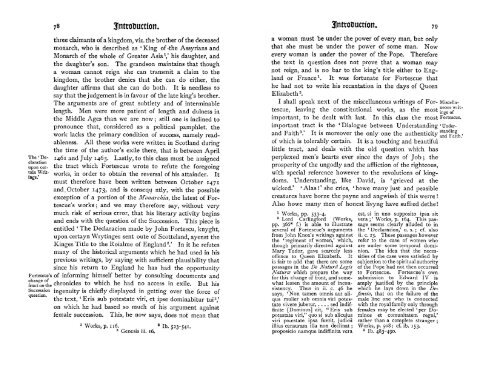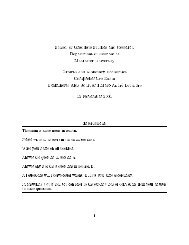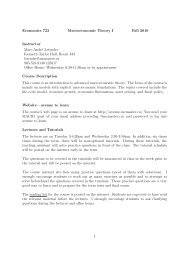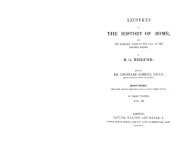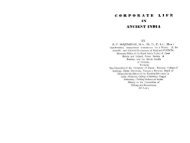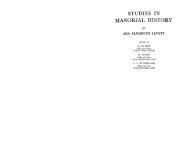The Difference between an Absolute and a Limited Monarchy
The Difference between an Absolute and a Limited Monarchy
The Difference between an Absolute and a Limited Monarchy
- No tags were found...
You also want an ePaper? Increase the reach of your titles
YUMPU automatically turns print PDFs into web optimized ePapers that Google loves.
<strong>The</strong> 'Declarationcer-:gS.Ft-three claim<strong>an</strong>ts of a kingdom, viz. the brother of the deceasedmonarch, who is described as ' King of -the Assyri<strong>an</strong>s <strong>an</strong>dMonarch of the whole of Greater Asia1,' his daughter, <strong>an</strong>dthe daughter's son. <strong>The</strong> gr<strong>an</strong>dson maintains that thougha wom<strong>an</strong> c<strong>an</strong>not reign she c<strong>an</strong> tr<strong>an</strong>smit a claim to thekingdom, the brother denies that she c<strong>an</strong> do either, thedaughter affirms that she c<strong>an</strong> do both. It is needless tosay that the judgement is in favour of the late king's brother.<strong>The</strong> arguments are of great subtlety <strong>an</strong>d of interminablelength. Men were more patient of length <strong>an</strong>d dulness inthe Middle Ages th<strong>an</strong> we are now; still one is inclined topronounce that, considered as a political pamphlet, thework lacks the primary condition of success, namely readableness.All these works were written in Scotl<strong>an</strong>d duringthe time of the author's exile there, that is <strong>between</strong> April1461 <strong>an</strong>d July 1463. Lastly, to this class must be assignedthe tract which Fortescue wrote to refute the foregoingworks, in order to obtain the reversal of his attainder. Itmust therefore have been written <strong>between</strong> October 1471<strong>an</strong>d, October 1473, <strong>an</strong>d is conseqq ntly, with the possibleexception of a portion of the Mo?zarchia, the latest of Fortescue'sworks; <strong>an</strong>d we may therefore say, without verymuch risk of serious error, that his literary activity begins<strong>an</strong>d ends with the question of the Succession. This piece isentitled ' <strong>The</strong> Declaracion made by John Fortescu, knyght,upon certayn Wrytinges sent oute of Scottel<strong>an</strong>d, ayenst theIcinges Title to the Roialme of Engl<strong>an</strong>d2.' In it he refutesm<strong>an</strong>y of the historical arguments which he had used in hisprevious writings, by saying with sufficient plausibility thatsince his return to Engl<strong>an</strong>d he has had the opportunityFortescue's of informing himself better by consulting documents <strong>an</strong>dch<strong>an</strong>ge offro,ltonthe chronicles to which he had no access in exile. But hisSl~cce:sion ingenuity is chiefly displayed in getting over the force ofquest~on. the text, ' Eris sub potestate viri, et ipse dominabitur tui3,'on which he had based so much of his argument againstfemale succession. This, he now says, does not me<strong>an</strong> thatI Works, p. I 16. Ib. 523-541.S Genesis iii. 16.a wom<strong>an</strong> must be under the power of every m<strong>an</strong>, but onlythat she must be under the power of some m<strong>an</strong>. Nowevery wom<strong>an</strong> is under the power of the Pope. <strong>The</strong>reforethe text in question does not prove that a wom<strong>an</strong> maynot reign, <strong>an</strong>d is no bar to the king's title either to Engl<strong>an</strong>dor Fr<strong>an</strong>ce1. It was fortunate for Fortescue thathe had not to write his rec<strong>an</strong>tation in the days of QueenElizabeth 2.I shall speak next of the miscell<strong>an</strong>eous writings of For- Miscellatescue,leaving the constitutional works, as the most neOL1sw'it' ings ofimport<strong>an</strong>t, to be dealt with last. In this class the most Fortescue.import<strong>an</strong>t tract is the 'Dialogue <strong>between</strong> Underst<strong>an</strong>ding 'Under<strong>an</strong>dFaith3.' It is moreover the only one the authenticity :,"$",h!of which is tolerably certain. It is a touching <strong>an</strong>d beautifullittle tract, <strong>an</strong>d deals with the old question which hasperplexed men's hearts ever since the days of Job; theprosperity of the ungodly <strong>an</strong>d the affliction of the righteous,with special reference however to the revolutions of kingdoms.Underst<strong>an</strong>ding, like David, is 'grieved at thewicked.' ' Alas !' she cries, ' howe m<strong>an</strong>y just <strong>an</strong>d peasiblecreatures have borne the payne <strong>an</strong>d <strong>an</strong>gwissh of this werre !Also howe m<strong>an</strong>y men of honest livyng have suffred dethe!' Works, PP.. 533-4.Lord Carhngford (Works,pp. 366" f.) is able to illustrateseveral of Fortescue's argumentsfrom John Knox's writings againstthe 'regiment of women,' which,though primarily directed againstILIary Tudor, gave scarcely lessoffence to Queen Elizabeth. Itis fair to add that there are somepassages in the De Noturn* LegisNatt~rce which prepare the wayfor this ch<strong>an</strong>ge of front, <strong>an</strong>d somewhatlessen the amount of incon-sistency. Thus in ii. c. 46 hesays, Non talnen omnis aut ali-qua mulier sub omnis viri potestatevivere jubetur, . . . . sed indiffinite[Dominus] ait, "Eris subpotestate viri," quo si sub alicujusviri po~estate ipsa fuerit, judiciiillius censuraln illa non declinat ;proposicio namque indiffinita veraest, si in uno supposito ipsa sitvera ;' Works, p. 164. This passageseems clearly alluded to inthe ' Declaration,' U. S. ; cf. alsoii. c. 23. <strong>The</strong>se passages howeverrefer to the case of women whoaye under some temporal dominlon.<strong>The</strong> idea that the necessitiesof the case were satisfied bysubjection to the spiritual authorityof the Pope had not then occurredto Fortescue. Fortescue's ownsubmission to Edward IV isamply justified by the principlewhich he lays down in the Befensio,that on the failure of themale line one who is connectedwith the royalfamily only throughfemales may be elected 'per Domlnoset comunitatem regni,'rather th<strong>an</strong> a complete str<strong>an</strong>ger;Works, p. 508 ; cf. ib. I 53.Ib. 483-490.


